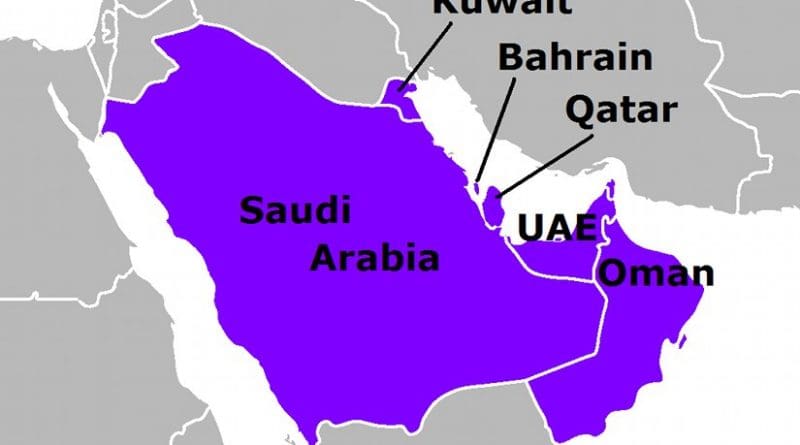GCC-US Summit And The Enduring Partnership – OpEd
By Arab News
By Abdel Aziz Aluwaisheg
On April 21, Riyadh hosted the second GCC-US summit. By all reasonable measures, the Riyadh summit was even a greater success than Camp David Summit last May, as it had the benefit of eleven months of extensive meetings between officials and experts on a wide range of security issues, including several ministerial meetings, and as such there was quite a bit of substance on the leaders’ agenda.
Last May, President Obama hosted the first summit in Washington and the GCC-US Strategic Partnership was born. The US had had long, extensive and strong ties with nearly every GCC member states. What was new about the Camp David Summit and the Riyadh Summit was that they marked the first time an American president met with all the GCC leaders and discussed with them how to forge a collective relationship between the US and the GCC as a group.
Previous administrations never developed such a relationship, relying exclusively on bilateral ties with each state separately. Some administrations took actions that weakened the GCC as an organization.
In the last year’s summit it was decided to hold the summit on a regular basis, without setting the frequency. However, President Obama wanted to hold a second summit before leaving office, and so it was held less than a year later. It remains to be seen with the next administration how frequent these summits are going to be.
The Riyadh Summit aimed to meet several objectives. First, to remove any notions that GCC-US relationship had somehow changed or that US commitment to its GCC allies had weakened, as many in the media had predicted.
Second, to agree on ways to counter Iran’s destabilizing activities, which have escalated since the nuclear deal came into effect in January 2016, contrary to some optimistic expectations.
Third, to discuss joint efforts to enhance the fight against terrorism and deescalate regional conflicts, such as in Syria, Iraq, Yemen and Libya.
Fourth, to take stock of the progress made since last May by the various joint-working groups set up in the Camp David framework.
Fifth, to discuss new initiatives, most notably the American proposal to enter into an elevated economic dialogue related to GCC “national transformation” plans.
While the Riyadh Summit has clearly met those goals, an equally important question is: Is the renewed GCC-US “Strategic Partnership” working?
Yemen is clearly a success. The Arab coalition, led by Saudi Arabia and supported by the US achieved its military goals by partially reversing the Houthi/Saleh coup and securing most of Yemen’s territory. Iran’s attempts to control Yemen and divide it along sectarian lines clearly failed. Finally, the third round of the UN-brokered talks are underway in Kuwait. In addition, the GCC increased humanitarian assistance to Yemen, setting up offices in Riyadh and Aden to coordinate aid delivery. Discussions about post-conflict reconstruction also started last month.
In Syria, where the Obama administration was criticized the most, the Americans stressed that GCC-US coordination was a key factor in reaching the cease-fire. The summit reaffirmed agreed elements of the solution: Full transition without Assad, continued pressure on Daesh and Al-Qaeda, and accelerated aid delivery to refugees, the internally displaced and besieged communities.
On Iraq, despite some differences of opinion, GCC-US coordination contributed, together with the international coalition and the Iraqi government, to reducing the area under Daesh control by about 40 percent since last year. There was also some progress in addressing imbalances in Iraqi political and security systems. More needs to be done, as the summit’s communiqué made clear, on that score as well on stabilizing areas liberated from Daesh control.
On Libya, GCC-US coordination paid off in the emergence of the Government of National Accord in Tripoli. The summit called on all Libyans to support it and on the international community to assist the new government to fight terrorism and extend its control over all of Libya.
On the Palestinian question, where GCC and US views usually diverge, there was some consensus as well, made easier by Israel’s recent provocations in Jerusalem, the Golan heights and in expanding settlements everywhere. The summit stressed that the goal should be “a just, lasting, comprehensive peace agreement that results in a sovereign and contiguous Palestinian state” with the Arab Peace Initiative providing the best basis. The next months should demonstrate how this consensus could be turned into something more concrete. There are already a number of initiatives to break the deadlock that should test this renewed American commitment.
So for regional issues we can see that the GCC-US partnership is moving in the right direction: Reversing gains by terrorist groups, Iran and its proxies, and de-escalating most regional conflicts, although by no means solving them. What about the quantum leap in GCC-US security cooperation promised in Camp David? What about the grand plan to face Iran’s destabilizing activities in the GCC region and beyond? And what about the new “economic dialogue” initiative put forward by the US? These are subjects for another day.

